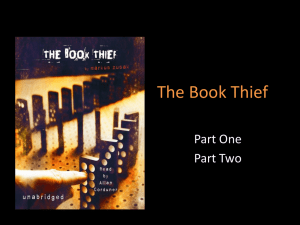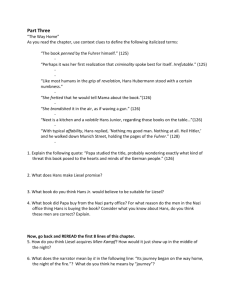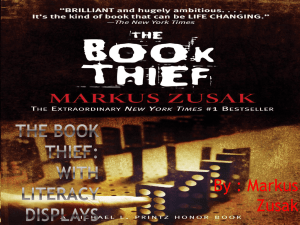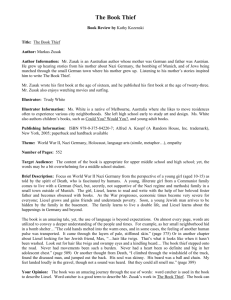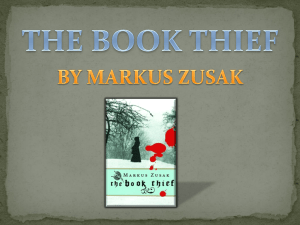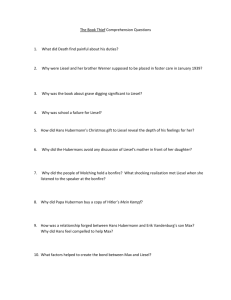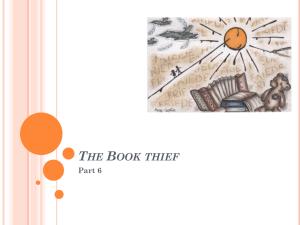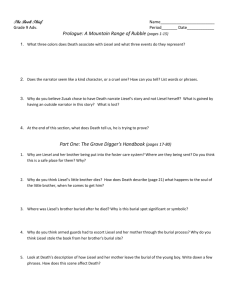The Book Thief Discussion Guide
advertisement
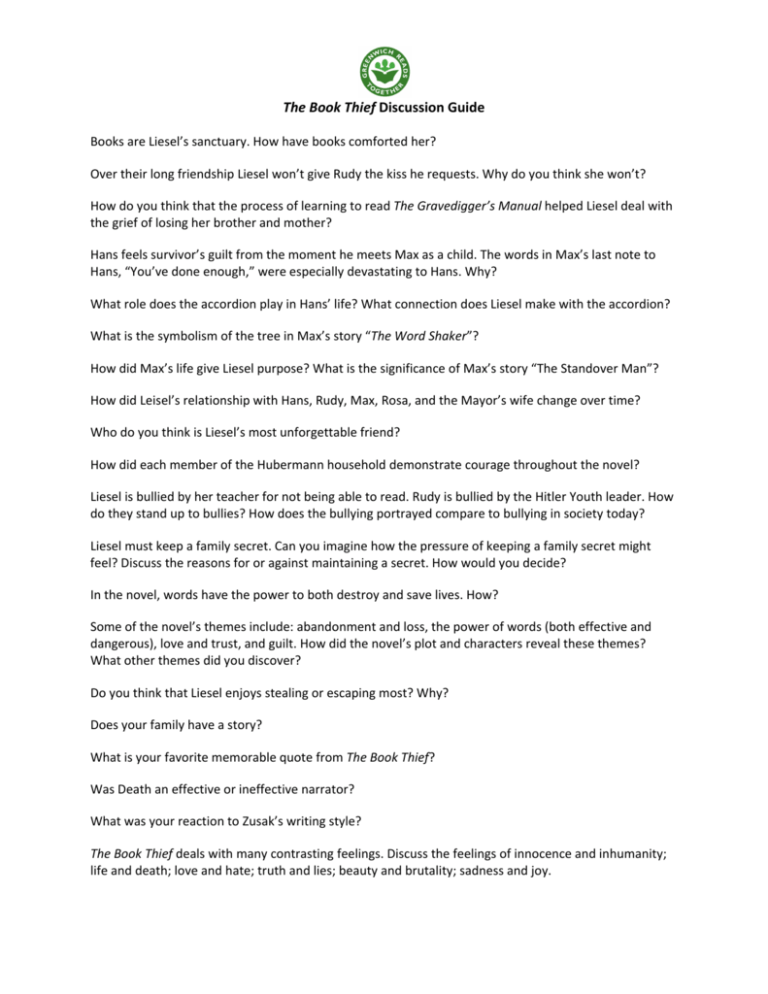
The Book Thief Discussion Guide Books are Liesel’s sanctuary. How have books comforted her? Over their long friendship Liesel won’t give Rudy the kiss he requests. Why do you think she won’t? How do you think that the process of learning to read The Gravedigger’s Manual helped Liesel deal with the grief of losing her brother and mother? Hans feels survivor’s guilt from the moment he meets Max as a child. The words in Max’s last note to Hans, “You’ve done enough,” were especially devastating to Hans. Why? What role does the accordion play in Hans’ life? What connection does Liesel make with the accordion? What is the symbolism of the tree in Max’s story “The Word Shaker”? How did Max’s life give Liesel purpose? What is the significance of Max’s story “The Standover Man”? How did Leisel’s relationship with Hans, Rudy, Max, Rosa, and the Mayor’s wife change over time? Who do you think is Liesel’s most unforgettable friend? How did each member of the Hubermann household demonstrate courage throughout the novel? Liesel is bullied by her teacher for not being able to read. Rudy is bullied by the Hitler Youth leader. How do they stand up to bullies? How does the bullying portrayed compare to bullying in society today? Liesel must keep a family secret. Can you imagine how the pressure of keeping a family secret might feel? Discuss the reasons for or against maintaining a secret. How would you decide? In the novel, words have the power to both destroy and save lives. How? Some of the novel’s themes include: abandonment and loss, the power of words (both effective and dangerous), love and trust, and guilt. How did the novel’s plot and characters reveal these themes? What other themes did you discover? Do you think that Liesel enjoys stealing or escaping most? Why? Does your family have a story? What is your favorite memorable quote from The Book Thief? Was Death an effective or ineffective narrator? What was your reaction to Zusak’s writing style? The Book Thief deals with many contrasting feelings. Discuss the feelings of innocence and inhumanity; life and death; love and hate; truth and lies; beauty and brutality; sadness and joy. The Book Thief: Questions for Teens From the “Book Club in a Box” manual: For which readers do you feel this book fits best and why? (pg.12) Consider the relationship of book burning and censorship. Do they accomplish the same thing? Is one process worse than the other? (pg. 21) We all make promises we don’t expect to keep. Should Hans be expected to keep his? Under the circumstances, would it have been acceptable for him to refuse Max sanctuary? (pg.34) Which of Liesel’s books is your favorite? What do you think of the book that Liesel wrote? Why does Death carry it with him wherever he goes? (pg.44) Who is Death’s boss? (pg.45) Is it up to us to judge another person’s actions and motives? What would we do if we were faced with this dilemma? (pg.47) Each of the above speculations are the responses of individual readers who have discussed The Book Thief in their group sessions. Can you think of other relevant connections? (pg. 55‐section about the illustrations and typeset) Do you agree with Zusak’s open‐ended approach? Would you have preferred closure? For which topic? (pg.57) How did you feel about the use of color in the book? (pg. 64) Is Rudy the most charming character in the novel? Of all the major and minor characters in the novel, who is your most or least favorite? Why? (pg.75) How is the idea of a book a metaphor for human experience, action, innocence and guilt? Consider how Zusak uses Hitler’s book Mein Kampf, to explore these issues? Are there other books that you can name that can accomplish this as well? (pg. 76) How does the humanization of Death contribute to the overall story? Do you agree with Zusak’s narrative choice? Is Death a reliable narrator? Can you suspend your disbelief to accept the idea that death is afraid of people in the same way that people fear death? (pg. 76) A few questions from other sources: What role does the accordion play in Hans’ life? What connection does Liesel make with the accordion? Who do you think is Liesel’s most unforgettable friend? Liesel must keep a family secret? Can you imagine how the pressure of keeping a family secret might feel? Discuss the reasons for or against maintaining a secret. How would you decide? The Grave Digger's Handbook is the first book Liesel steals. Why did she take the book? What is significant about the titles of the books she steals? Discuss why she hides The Grave Digger's Handbook under her mattress. Describe Hans Hubermann's reaction when he discovers the book. What does the act of book thievery teach Liesel about life and death? Explain Rudy's reaction when he discovers that Liesel is a book thief. How does stealing books from the mayor's house lead to a friendship with the mayor's wife? Explain how Liesel's own attempt to write a book saves her life. Death says that Liesel was a girl "with a mountain to climb." (p. 86) What is her mountain? Who are her climbing partners? What is her greatest obstacle? At what point does she reach the summit of her mountain? Describe her descent. What does she discover at the foot of her mountain? How does Zusak use the literary device of foreshadowing to pull the reader into the story? Abandonment is a central theme in the novel. The reader knows that Liesel feels abandoned by her mother and by the death of her brother. How does she equate love with abandonment? At what point does she understand why she was abandoned by her mother? Who else abandons Liesel in the novel? Debate whether she was abandoned by circumstance or by the heart. Guilt is another recurring theme in the novel. Hans Hubermann's life was spared in France during World War I, and Erik Vandenburg's life was taken. Explain why Hans feels guilty about Erik's death. Guilt is a powerful emotion that may cause a person to become unhappy and despondent. Discuss how Hans channels his guilt into helping others. Explain Max Vandenburg's thought, "Living was living. The price was guilt and shame." (p. 208) Why does he feel guilt and shame?
